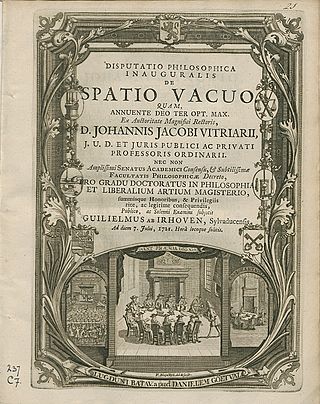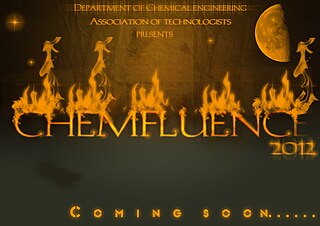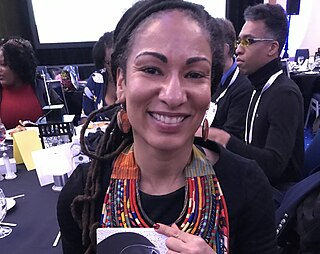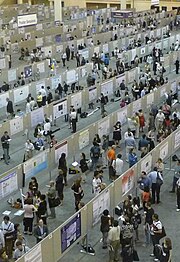
A thesis, or dissertation, is a document submitted in support of candidature for an academic degree or professional qualification presenting the author's research and findings. In some contexts, the word thesis or a cognate is used for part of a bachelor's or master's course, while dissertation is normally applied to a doctorate. This is the typical arrangement in American English. In other contexts, such as within most institutions of the United Kingdom and Republic of Ireland, the reverse is true. The term graduate thesis is sometimes used to refer to both master's theses and doctoral dissertations.
The International Congress on Medieval Studies is an annual academic conference held for scholars specializing in, or with an interest in, medieval studies. It is sponsored by the Medieval Institute at the Western Michigan University in Kalamazoo, Michigan, and is held during the first half of May. The Congress is the largest annual gathering in the field, regularly attracting over three thousand registered participants from all over the world. The 50th annual conference took place in 2015.
An abstract is a brief summary of a research article, thesis, review, conference proceeding, or any in-depth analysis of a particular subject and is often used to help the reader quickly ascertain the paper's purpose. When used, an abstract always appears at the beginning of a manuscript or typescript, acting as the point-of-entry for any given academic paper or patent application. Abstracting and indexing services for various academic disciplines are aimed at compiling a body of literature for that particular subject.

A seminar is a form of academic instruction, either at an academic institution or offered by a commercial or professional organization. It has the function of bringing together small groups for recurring meetings, focusing each time on some particular subject, in which everyone present is requested to participate. This is often accomplished through an ongoing Socratic dialogue with a seminar leader or instructor, or through a more formal presentation of research. It is essentially a place where assigned readings are discussed, questions can be raised and debates can be conducted.
WMSCI, the World Multi-conference on Systemics, Cybernetics and Informatics, is a conference that has occurred annually since 1995, which emphasizes the systemic relationships that exist or might exist among different disciplines in the fields of Systemics, Cybernetics, and Informatics. Organizers stress interdisciplinary communication, describing the conference as both wide in scope as a general international scientific meeting, and specifically focused in the manner of a subject-area conference.

An academic conference or scientific conference is an event for researchers to present and discuss their scholarly work. Together with academic or scientific journals and preprint archives, conferences provide an important channel for exchange of information between researchers. Further benefits of participating in academic conferences include learning effects in terms of presentation skills and “academic habitus”, receiving feedback from peers for one's own research, the possibility to engage in informal communication with peers about work opportunities and collaborations, and getting an overview of current research in one or more disciplines.
Abstract management is the process of accepting and preparing abstracts for presentation at an academic conference. The process consists of either invited or proffered submissions of the abstract or summary of work. The abstract typically states the hypothesis, tools used in research or investigation, data collected, and a summary or interpretation of the data.
Canadian Association of Physicists (CAP), or in French Association canadienne des physiciens et physiciennes (ACP) is a Canadian professional society that focuses on creating awareness among Canadians and Canadian legislators of physics issues, sponsoring physics related events, physics outreach, and publishes Physics in Canada. It was founded in July 1945. The organization has over 1,600 members and is bilingual, functioning in English and French.

The ACM Web Conference is a yearly international academic conference on the topic of the future direction of the World Wide Web. The first conference of many was held and organized by Robert Cailliau in 1994 at CERN in Geneva, Switzerland. The conference has been organized by the International World Wide Web Conference Committee (IW3C2), also founded by Robert Cailliau and colleague Joseph Hardin, every year since. In 2020, the Web Conference series became affiliated with the Association for Computing Machinery (ACM), where it is supported by ACM SIGWEB. The conference's location rotates among North America, Europe, and Asia and its events usually span a period of five days. The conference aims to provide a forum in which "key influencers, decision makers, technologists, businesses and standards bodies" can both present their ongoing work, research, and opinions as well as receive feedback from some of the most knowledgeable people in the field.
Library instruction, also called bibliographic instruction, user education and library orientation, consists of "instructional programs designed to teach library users how to locate the information they need quickly and effectively. [It] usually covers the library's system of organizing materials, the structure of the literature of the field, research methodologies appropriate to the academic discipline, and specific resources and finding tools " It prepares individuals to make immediate and lifelong use of information effectively by teaching the concepts and logic of information access and evaluation, and by fostering information independence and critical thinking. Above all they are aimed at equipping library users with skills to locate library sources and use them effectively to satisfy their information needs.

The International Communication Association (ICA) is an academic association for scholars interested in the study, teaching and application of all aspects of human and mediated communication.
The American Society for Horticultural Science (ASHS) is the world’s premier professional society for horticultural science. Founded in 1903, the mission of ASHS is to promote and encourage national and international interest in scientific research and education in horticulture in all its branches. The more than 2500 ASHS members in all 50 states and 60 countries around the world fulfill this mission by sharing the results of their research, teaching, extension, and community engagement activities with their colleagues and humankind the world over.

A poster is a large sheet that is placed either on a public space to promote something or on a wall as decoration. Typically, posters include both textual and graphic elements, although a poster may be either wholly graphical or wholly text. Posters are designed to be both eye-catching and informative. Posters may be used for many purposes. They are a frequent tool of advertisers, propagandists, protestors, and other groups trying to communicate a message. Posters are also used for reproductions of artwork, particularly famous works, and are generally low-cost compared to the original artwork. The modern poster, as we know it, however, dates back to the 1840s and 1850s when the printing industry perfected colour lithography and made mass production possible.
The Interservice/Industry Training, Simulation and Education Conference (I/ITSEC) is an annual conference in Orlando, Florida organized by the National Training and Simulation Association held at the Orange County Convention Centre, a large conference and exhibition centre located on Exhibition Drive on the south side of Orlando.
The International Society of Military Sciences (ISMS) is an international organization whose stated aim is to build a strong network for the creation, development, exchange and diffusion of research and knowledge about war, conflict management and peace support efforts. The ISMS was founded in October 2008. The Austrian National Defence Academy, the Royal Military College of Canada, the Royal Danish Defence College, the Finnish National Defence University, the Netherlands Defence Academy, the Norwegian Defence University College, the Swedish National Defence College and the Baltic Defence College established this society with the intention to further research and academic education in military arts and sciences in the broadest sense.

Chemfluence is a national level technical symposium of Department of Chemical Engineering, A C College of Technology, Anna University, India. Started in 1994 as a college level symposium, it is now in its 24th year. Paper presentations, poster presentations, guest lectures, workshops and events form an integral part of the symposium. The symposium mainly aims at nourishing budding chemical engineers with knowledge of core concepts and providing an opportunity to showcase their talents. With more than 20 events across 5 days, it is one of the most prestigious tech events of South India. It is also one of the very few symposiums in India to host a cultural fest in association with university departments. Chemfluence is conducted annually by Consortium of Chemical Technologists, the official student body of Department of Chemical Engineering, Anna University.
A micro-conference is a small scale conference that allows researchers to present and discuss their work. They provide a channel for the exchange of nascent ideas and an opportunity for academic collaboration.
A virtual learning environment (VLE) in educational technology is a web-based platform for the digital aspects of courses of study, usually within educational institutions. They present resources, activities, and interactions within a course structure and provide for the different stages of assessment. VLEs also usually report on participation and have some level of integration with other institutional systems. In North America, VLEs are often referred to as Learning Management Systems (LMS).

The International Conference on Computational Intelligence Methods for Bioinformatics and Biostatistics (CIBB) is a yearly scientific conference focused on machine learning and computational intelligence applied to bioinformatics and biostatistics.

Black in AI, formally called the Black in AI Workshop, is a technology research organization and affinity group, founded by computer scientists Timnit Gebru and Rediet Abebe in 2017. It started as a conference workshop, later pivoting into an organization. Black in AI increases the presence and inclusion of Black people in the field of artificial intelligence (AI) by creating space for sharing ideas, fostering collaborations, mentorship, and advocacy.









